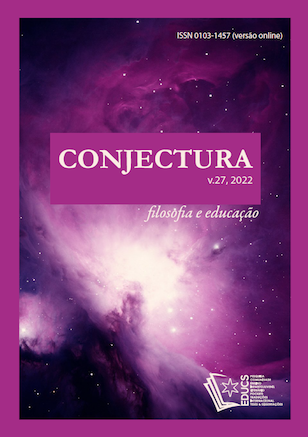A microfísica reativa procrustiana, corpos transexuais e o trans-dialogismo educacional
DOI:
https://doi.org/10.18226/21784612.v27.e022011Abstract
A Proposta de uma Cartografia dos Descostumes envolve o mapear de deslocamentos de pensamento atinentes ao itinerário ético da educação em processo de violência e conflito direto com o cis-tema, uma vez que aborda as potências queer atravessadas por forças e devires, processos e movimentos, encontrados nas fendas da realidade. A palavra “diálogo” importa na união do prefixo grego “dia” que significa “através”, num sentido de ponte, travessia. O sufixo grego “logos” é etimologicamente significado como palavra ou relação. O transdialogismo reclama para si uma potência que fricciona o repertório de representações de verdades impostas e as experiências sensíveis que produzem efeitos em nosso corpo ultrapasassando os domínios e configurações do cis-tema e propõe uma nova geopolítica de gênero e sexualidade, sem identidades e padrões. A partir de tal pista, dois movimentos se mostram essenciais: 1) mapear as dissocializações e o controle dos corpos nas construções discursivas e normativas da maquinaria escolar; 2) Desedificar discursos educacionais que transitam no universo da representação (significado, significante e significação) na qual se baseia atualmente a pedagogia. Desdobra-se o acontecimento educação em processos, agenciamentos e dispositivos educacionais sem partirmos de objetivos pré-estabelecidos, mas considerando as pistas e movimentos das fendas sociais e encontrando potencias em realidades e cotidianos invisibilizados, mas, ainda assim, violentados e silenciados, partindo de um desejo do pesquisador de compreender esse trans-corpus através de um olhar diverso, diferente, que redimensione o habitual. Por fim, o artigo cartográfico produziu um mapa cortado por linhas de intensidade que partiram do conceito de biopoder em direção ao de necropolítica como condicionantes da maquinaria escolar em seu entrelace junto ao cis-tema Capitalístico, mas que é afrontada pelo inabitual e pelo estranho que delineia as potências queer.
Literaturhinweise
ALBUQUERQUE JÚNIOR, D. M.; VEIGA-NETO, A.; SOUZA FILHO, A. Apresentação: Uma cartografia das margens. In. RAGO, M.; VEIGA-NETO, A. (orgs.). Figuras de Foucault. Belo Horizonte: Autêntica editora, 2013.
CASTRO, E. Vocabulário de Foucault: um percurso pelos seus temas, conceitos e autores. Belo Horizonte: Autêntica, 2016.
DELEUZE, G. O abecedário de Gilles Deleuze. Entrevista concedida a Claire Parnet.1988.
DELEUZE, G. Lógica do sentido. São Paulo: Perspectiva, 2000.
DELEUZE, G. Empirismo e subjetividade. São Paulo: Ed. 34, 2001.
DELEUZE, G. A imanência, uma vida... Disponível em: <http://www.letras.ufrj.br/ciencialit/terceiramargemonline/numero11/xiii.html>. Acesso em: mar. 2010.
FOUCAULT, M. Ordem do discurso. Edições Loyola, 1996.
FOUCAULT, M. Ditos e Escritos. Vol. III: estética, literatura e pintura, música e cinema. Rio de Janeiro: Forense universitária, 2001.
FOUCAULT, Michel. A Arqueologia do Saber. Rio de Janeiro: Forense Universitária, 2012.
HILÁRIO, L. C. Da biopolítica à necropolítica: variações foucaultianas na periferia do capitalismo. Sapere aude, v. 7, n. 13, p. 194-210, 2016.
LUDERMIR, C. A História Incompleta de Brenda e de Outras Mulheres. Rio de Janeiro: Confraria do Vento, 2016
MARINHO, C. M. Filosofia da Diferença no Brasil: da identidade à diferença. São Paulo: Edições Loyola, 2014.
MBEMBE, A. Necropolítica. São Paulo: n-1 edições, 2016.
PASSOS, E.; KASTRUP, V.; ESCÓSSIA, L. Introdução. In: PASSOS, E.; KASTRUP, Virgínia; E. (Org.). Pistas do método da cartografia: Pesquisa-intervenção e produção de subjetividade. Porto Alegre: Sulina, 2015.
PESSOA, Fernando. Livro do Desassossego. Lisboa: Ática, 1992.
PRECIADO, B. Manifesto Contrassexual: políticas subversivas de identidade sexual. São Paulo: n-1 edições, 2014.
RESENDE, C. A escrita de um corpo sem órgãos. Fractal: Revista de Psicologia, v. 20, n. 1, p. 65-75, 2008.
RHODEN, E.; BERTOTTO, L. Cidade da Periferia: Linguagem, Comunicação e Pedagogia. Disponível em: http://www.intercom.org.br/papers/regionais/sul2010/resumos/R20-0945-1.pdf. Acessado em: 15 out. 2017
ROLNIK, S. Toxicômanos de identidade: subjetividade em tempo de globalização. Cultura e subjetividade. Saberes Nômades, Campinas: Papirus, 1997. p. 19-24.
ROLNIK, S. Flowerings of Reality/Florações da Realidade. In: DE ZEGHER, C. (Org.). Vida Afora /Life Line. Anna Maria Maiolino. New York: The Drawing Center, 2006, v. , p. 107-112.
ROLNIK, S. A hora da micropolítica. Goethe Institut, 2016. Disponível em: https://www.goethe.de/ins/br/pt/kul/fok/rul/20790860.html. Acessado em: 15 out. 2017.
RORTY, R. A filosofia e o espelho da natureza. Lisboa: D. Quixote, 1988.
SERRATO, A. C. O corpo e a sexualidade na cama de procusto: valores e desafios na contemporaneidade. Revista Pistis & Praxis: Teologia e Pastoral, v. 2, n. 1, p. 145-172, 2010.
SOUSA FILHO, A. Foucault: O cuidado de si e a liberdade ou a liberdade é uma agonística. In. RAGO, M.; VEIGA-NETO, A. (orgs.). Figuras de Foucault. Belo Horizonte: Autêntica editora, 2013.
VEIGA-NETO, Alfredo. Dominação, violência, poder e educação em tempos de império. In. RAGO, M.; VEIGA-NETO, A. (orgs.). Figuras de Foucault. Belo Horizonte: Autêntica editora, 2013.
ZOURABICHVILI, F. O vocabulário de Deleuze. Rio de Janeiro: Relume Dumará, 2004.
Downloads
Veröffentlicht
Zitationsvorschlag
Ausgabe
Rubrik
Lizenz
1. A publicação dos originais implicará a cessão dos direitos autorais à revista Conjectura.
2. Os textos não poderão ser reproduzidos sem autorização da revista depois de aceitos.

Este trabalho está licenciado com uma Licença Creative Commons - Atribuição 4.0 Internacional.









